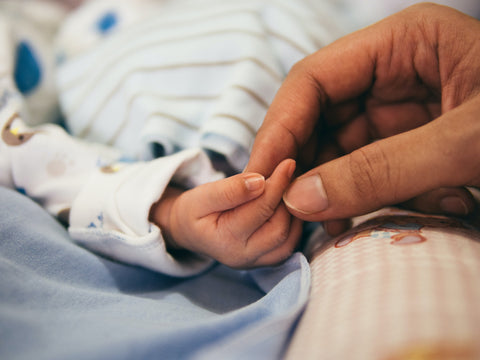Feelings during the Postpartum Period
“The love for your child will surpass all else. ”,“ Nothing is as important as the well-being of your own child ”,“ When the child is in the world, you will forget all suffering and you will think that it was worth it. “, Like this or similar, the delivery of a child is generally often romanticized while the reality of the puerperium is concealed. The ideal image of the selfless, loving and caring mother prevents open discourse about negative feelings and thoughts during the puerperium. For many women, however, the puerperium is not the most beautiful thing on earth, but a deep physical and emotional shock.
Feelings of depression are not uncommon in the puerperium: Around three quarters of all women who have recently given birth experience a temporary phase of depression or sadnesswhich usually starts three to six days after delivery. So-called “crying days” or “baby blues”.
On the physical level, the enormous hormonal changes that take place after the birth and with the onset of milk production are primarily responsible for the low mood. The woman who has recently given birth experiences pronounced emotionality and increased sensitivity. Own feelings and external stimuli are perceived more intensely. For example, women who have recently given birth can smell particularly well and thus recognize their child by its scent.

But not only the hormonal change is enormous. Hand in hand with the birth of the child goes hand in hand with the birth of the mother and with it the change in her entire life up to now. This can be overwhelming or even scary. The mother finds herself in a previously unknown situation and is confronted with intense feelings, which are intensified by the increased sensitivity due to the hormonal change.
On the one hand, many women who have recently given birth experience grief. Mourning the loss of life in front of the child and the lost independence of body and mind. Mourning for one's own freedom. The relationship to yourself and to your environment is turned upside down. A new definition of self is established: I am now a mother. A new definition of the partner: We are now parents. Friends who can pursue their interests unchanged while the mother wrestles with inflamed nipples and the hungry baby. A farewell that must first be processed before the mother can embark on a new beginning.
The woman who has recently given birth is exhausted. She has come through the exhausting act of childbirth. Your body, still suffering from the birth injuries, now has to adjust to the non-pregnant circumstance. At the same time, she must be ready to care for and possibly breastfeed a newborn around the clock. She is tired but can only sleep when the baby is asleep. Your vagina is sore, bleeding, and may be afraid to urinate or defecate for the first time since giving birth. The baby should be breastfed as often as possible to stimulate milk production. Then change diapers and sleep. Instead of the day and night rhythm, the two-hour cycle is now used. Everyday life is determined by the baby and the mother has to take care of her child with all her body and mind. A tremendous effort.

And then, at the height of this sensitive time, women who have recently given birth are discharged from the clinic. From this point on, many mothers in western Europe are more or less on their own. D.he nuclear family is a family model that offers most mothers insufficient support during these stressful times. Supporting grandparents during this time is no longer as common in western Europe as it is in Japan, for example, where the mother returns to her own home for the birth of a child and spends the following three months there and is looked after. In Japan, going home for the birth of the child is referred to as Satogaerishussan. Cooking food, cleaning, washing clothes, bathing and changing the baby, all of this is taken from the mother by her parents so that she can recover from the hardships of childbirth. After three months, the mother and her child return to their partner.
The puerperium is an essential physical and emotional healing process. Precisely because the mother's emotional and physical protective walls are falling, a safe and understanding environment is of enormous importance. The mother is allowed to withdraw from social life after the birth and take the time to arrive in her new life, to heal and to get to know the baby without having to justify herself to anyone. However, she can also obtain active and moral support from her partner, family or friends. The mother and her needs are now paramount. She can protect herself from things that go too far, are too much or hit her too deep, and she can set limits.

The puerperium is associated with feelings of joy and love. But not only, and not necessarily predominantly either. The majority of women who have recently given birth experience a temporary low mood after giving birth. The mother is allowed to leave the false cliché of the happy newcomer behind and just cry.
Book your first free and non-binding introductory meeting with annahasepsychologie, here ...
If the low mood lasts longer than two weeks with no prospect of improvement, there is suspicion of postpartum depression. You should then speak to your midwife, maternal advisor or your gynecologist as soon as possible or seek professional psychological support. You don't have to go through it alone.


